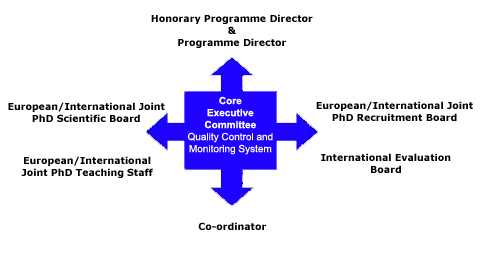The European/International Joint Ph.D. Scientific Board is composed of all representative partners from member universities (one from each partner university). Chaired by the programme co-ordinator, the European/International Joint Ph.D. Scientific Board discusses the guiding strategies identified by the Core Executive Committee and contributes to the development of program quality. In particular the members are responsible for:
-
promoting the development of the European/International Joint Ph.D. programme at their own university and in their own countries,
-
promotion of each partner's carefully recruited candidates
-
promotion of other qualified tutors
-
strong commitment for increasing the institutional impact at each partner institution and for seeking resources for the sustainability of the joint program
-
active role in the scientific and training activities related to the European/International Joint Ph.D. program (internally for its development and for its external dissemination).
-
promotion of initiatives dedicated to European/International Joint Ph.D. research trainees or simply extended to them (such as local Ph.D. seminars) organized by each partner university
-
dissemination of information about their scientific activity and the activity of other partners by actively updating the information available on the European/International Joint Ph.D. web site.
In addition, when members of the European/International Joint Ph.D. Scientific Board act as tutors, they must guarantee their active cooperation, as described below for the European/International Joint Ph.D. Teaching Staff.
The European Scientific Board will be kept informed of any relevant decisions taken by the Core Executive Committee.
In the event that they are no longer able to guarantee their co-operation in accordance with the contractual obligations of the funded programmes, they must inform the Executive Committee, who may request they resign from the European/International Joint Ph.D. Scientific Board.
Research trainees can formally ask the Coordinator to include special organizational issues in the agenda of European/International Joint Ph.D. Scientific Board meetings and to take part in its meetings via a representative. At the invitation of the co-ordinator, scholars involved in the doctorate's training activities may participate in the meetings of the European/International Joint Ph.D. Scientific Board but without voting privileges.
The International Evaluation Board (Final Jury) is responsible for evaluating research trainees’ final Ph.D. dissertations and final oral defence, upon multistep evaluation by the main tutor and the two co-tutors and independent admission by two external experts (who may decide that the thesis should be revised and re-evalutated to be defended by max additional 6 months). The Final Jury is composed of a minimum of academics (chosen from a list of six academics designated by the participant universities) who can belong or not to partner universities, as well international experts from outside the European/International Joint PhD network, who are required to prepare a written report on the thesis. According to the regulations of the University of Rome Sapienza, at least 2 members of the Final Jury should not belong to the program and to the coordinating University Sapienza and no one of the members of the Final Jury can serve on the board more than once in a three-year period. The three tutors can participate in the discussion, but not in the final evaluation.
The European/International Joint Ph.D. Teaching Staff is composed of all the professors, researchers and tutors belonging to partner universities involved in the European/International Joint Ph.D. program didactic and scientific activities, such as tutoring and co-tutoring, International Summer Schools, video-conferences, etc. The staff should include at least ten scholars and a minimum of three academicians from the founding university. At the request of the European/International Joint Ph.D. Scientific Board and at the co-ordinator's invitation, tutors can be assigned and professors and researchers from universities that are not programme partners can be involved in the doctorate's training activities. Like all other members, they have the same duty to respect the standards agreed to concerning training goals.
To facilitate attainment of the highest standard of quality in research training for participants in the European/International Joint Ph.D. programme, tutors must guarantee their co-operation to achieve the general goals of the programme and the various activities planned in accordance with specific agreements. In particular, tutors are responsible for:
-
concerted and intensive use of thoughtfully designed tutoring and co-tutoring training formulas, avoiding confusion in the delegation of responsibilities among the three tutors and a "free-flowing state" for Ph.D. research trainees
-
systematic use of tools designed according to shared criteria for evaluating initial, intermediate and advanced research reports
-
providing regular information to the coordinator in order to update credits earned by research trainees
In the event that they are no longer able to guarantee their co-operation they must inform the Executive Committee, who may request them to resign from the European/International Joint Ph.D. Teaching Staff.
The European Tutors Board will be kept informed of any relevant decisions taken by the Core Executive Committee and the European Scientific Board.
The European/International Joint Ph.D. Recruitment Board is responsible for the final admission of applicants on the basis of a comparative evaluation of the scientific quality of applications and the compatibility of the proposed doctoral studies. It is composed of experts - who may or may not be from partner universities of the European/International Joint Ph.D. - designated by the representatives of the institutions participating in the Executive Committee. According to regulations by the University of Rome Sapienza, no one can serve on the board more than once in a three-year period.

